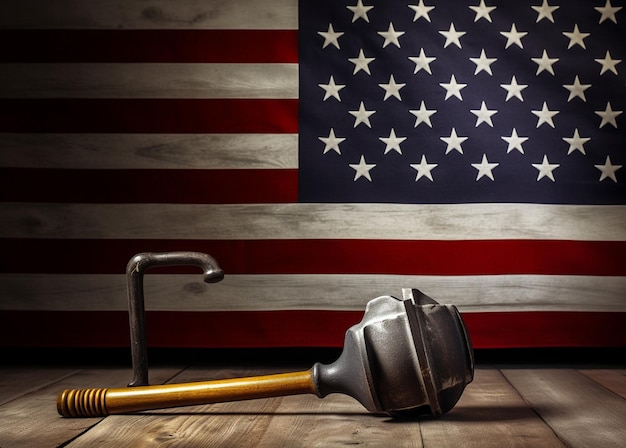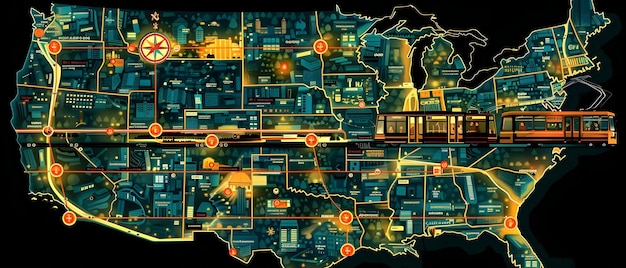Interstate Commerce Regulations 2025: What Businesses Need to Know

Anúncios
New regulations on interstate commerce are set to take effect in January 2025, impacting businesses across various sectors by introducing updated compliance standards, altering operational procedures, and requiring proactive adjustments to maintain seamless trade across state lines within the United States.
Get ready for a shift in how goods and services cross state lines! Breaking: New Regulations on Interstate Commerce Set to Take Effect January 2025 – What You Need to Know, bringing significant changes to businesses operating across state borders.
Anúncios
understanding the upcoming changes to interstate commerce
The landscape of interstate commerce is always evolving. Understanding the shifting regulatory environments is key to continued success. By gaining a clearer perspective on the coming changes, businesses can take proactive steps to adapt and thrive in the new era of interstate trade.
These changes aren’t just about compliance; they’re about setting the stage for fair and efficient trade practices across state lines.
The Scope of Interstate Commerce Regulations
Interstate commerce regulations govern the buying, selling, and exchange of commodities, transportation, or people between different states. The aim is to ensure a level playing field and prevent individual states from enacting laws that unduly burden commerce across state lines.
- Economic Development: Facilitating economic growth by allowing free flow of goods and services.
- Consumer Protection: Protecting consumers from harmful or deceptive business practices that could arise in the absence of federal regulation.
- National Security: Addressing areas like cybersecurity and supply chain integrity to protect national interests.
Anúncios

Overall, being well-informed about the details of interstate commerce is essential for businesses when changes occur. It ensures operational compliance and can strategically enhance market reach and competitiveness.
key provisions of the new regulations
The upcoming regulations are a multi-faceted overhaul that touches on different facets of interstate commercial activities. Knowing what these specific adjustments are is vital for strategizing how to incorporate them into day-to-day procedures.
The aim behind each new mandate is to modernize and streamline the ways businesses conduct business with each other beyond state boundaries.
Modernizing Data Privacy Standards
One significant shift is the introduction of more stringent data privacy standards. These rules are designed to harmonize data protection laws across different states and bring them in line with global standards like GDPR.
Impact on E-commerce Platforms
The new regulations have the potential to significantly affect e-commerce platforms. By simplifying sales tax collection at the national level, businesses can experience increased efficiency, but they also need to ensure compliance with updated rules for digital transactions.
- Tax Collection: New tax collection methods will standardize how e-commerce taxes are compiled and reported across various states.
- Digital Transactions: Enhanced security measures are aimed at protecting digital transactions from fraud and cybersecurity threats.
- Consumer Rights: Expansion of consumer rights in digital transactions, ensuring greater transparency and protection against unfair commercial practices.
Updating data privacy and protection protocols should be considered when determining business strategy in order to avoid unnecessary compliance challenges.
how these changes affect different industries
The implications of the new regulations vary significantly across different sectors. Tailoring compliance strategies to address the unique aspects of each industry is paramount for successful adoption.
Whether it’s manufacturing, agriculture, or technology, businesses must assess how the proposed changes align with their usual operations.
Manufacturing Sector
The new standards could create challenges in procurement, production, and distribution. Preparing for these challenges by understanding and adapting to the updated guidelines is essential for maintaining efficiency and legal compliance in this sector.
Agricultural Sector
The updated transportation and trade rules will significantly impact shipping agricultural products across state lines. Growers and distributors will likely need to update their logistical operations to adapt to these new requirements. Being proactive in making these adjustments will prevent bottlenecks in supply chains.

Ultimately, each industry must develop a strategic approach to properly deal with its unique nuances. Doing so will lead to continuing growth while minimizing potential complications.
preparing your business for january 2025
Strategic preparation is paramount if businesses expect to smoothly transition into the upcoming regulatory changes. The better prepared a business is, the better chance it has to avoid costly interruptions.
By following these steps, companies can streamline and optimize their operations to handle the forthcoming regulations.
Conduct an Internal Audit
The initial step to take is conducting a comprehensive internal audit that assesses how current activities align with future regulations. This audit will identify gaps and areas requiring improvement to establish a solid foundation for compliance.
Training Programs for Workforce
Equipping your workforce with the information they need is necessary for successful adoption of the new regulations. Training programs that educate personnel about their specific roles in compliance will empower them to effectively handle the changing requirements.
- Compliance Training: Targeted training sessions explaining the details of interstate commerce and necessary procedures.
- Technological Adaptation: Training on new technologies and systems implemented to facilitate compliance.
- Continual Education: Regular sessions to update employees as regulatory interpretations evolve.
Thoughtful preparation enables businesses to not only comply with new requirements but also to enhance operational efficiency and improve their overall market position.
navigating compliance and enforcement
Navigating compliance and enforcement of interstate commerce regulations involves more than just understanding the laws. Businesses must also be adept at handling potential disputes with federal regulatory bodies.
Developing detailed procedures and proactive measures can reduce the likelihood of expensive legal troubles.
Understanding Federal Oversight
Federal agencies like the Federal Trade Commission (FTC) and the Department of Justice (DOJ) oversee many facets of interstate commerce to ensure fair competition and adherence to regulatory standards. Businesses must know which agencies have authority over their industry and understand their enforcement practices.
Dispute Resolution Mechanisms
Having access to efficient dispute resolution mechanisms is crucial for companies facing compliance challenges. Options like mediation, arbitration, and administrative appeals offer avenues for resolving conflicts without resorting to court.
Businesses that proactively learn all aspects of compliance are able to develop a more stable environment for growth and innovation within the framework of interstate commerce.
resources for businesses seeking assistance
Many resources are available to assist businesses in understanding and adapting to the new regulations. From legal support to educational materials, seeking the right guidance can simplify the transition process.
Exploring these support avenues provides companies with opportunities to enhance their knowledge and capabilities.
Government Agencies and Programs
Numerous government agencies offer resources and programs designed to help companies understand federal regulations. These resources range from webinars and workshops to personalized consultations.
- Small Business Administration (SBA): Offers guidance on navigating the regulatory landscape.
- Department of Commerce (DOC): Provides insights into trade compliance.
- Industry Associations: Groups like the U.S. Chamber of Commerce provide resources tailored to specific industries.
Professional Consulting Services
Engaging professional consulting services ensures that companies receive expert guidance specific to the particular circumstances. Consultants assist with internal audits, compliance planning, and training programs.
By tapping into these supportive resources, companies can navigate the changing interstate commerce environment with greater confidence and skill.
| Key Point | Brief Description |
|---|---|
| ✅ Compliance Date | New regulations take effect January 2025, requiring immediate attention. |
| 🛡️ Data Privacy | Stricter data protection laws align with global standards. |
| 🚚 Logistics | Transportation and trade rules significantly affect agricultural product shipping. |
| 💼 Internal Audit | Conduct an audit to align operations with new rules. |
FAQ
▼
Interstate commerce refers to the trade, transport, or exchange of commodities, services, or money between states. It’s regulated by the federal government to ensure fair practices and prevent trade barriers.
▼
The new interstate commerce regulations are scheduled to take effect in January 2025. Businesses should prepare now to understand and implement the necessary changes.
▼
E-commerce businesses will see stricter sales tax collection requirements and enhanced digital transaction laws. These changes aim to standardize practices and protect consumer rights online.
▼
The new regulations will enforce more stringent data protection measures. Businesses must ensure they are compliant with requirements such as GDPR to protect consumer data.
▼
Resources include SBA programs, DOC guidance, industry associations like the Chamber of Commerce, and consultant services. Also, explore webinars to update employees as regulatory interpretations evolve.
Conclusion
As January 2025 approaches, understanding and adapting to the new interstate commerce regulations is crucial for businesses. By taking proactive steps to evaluate current practices, seek support, and implement necessary changes, businesses can guarantee seamless operations and maintain a competitive edge in an evolving marketplace.